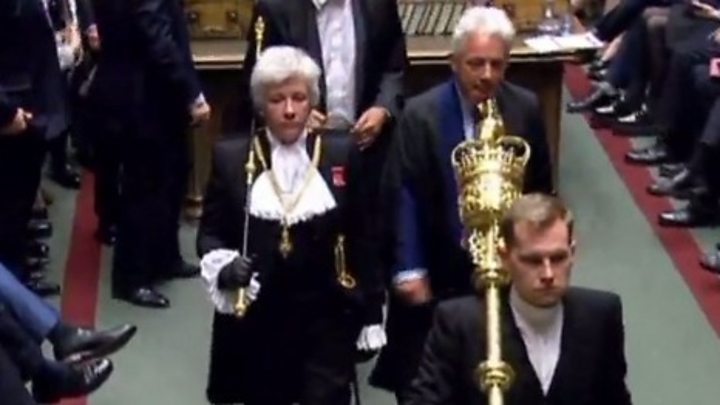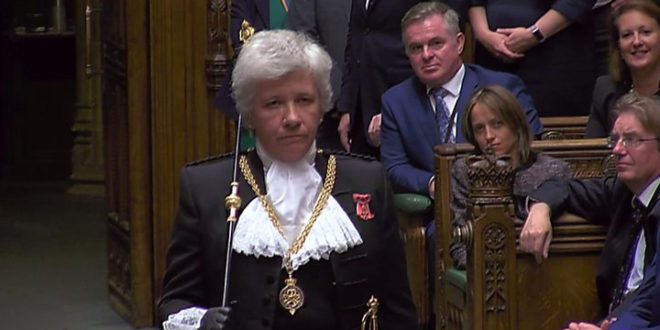Labour has said it is “more important than ever” that Parliament is recalled after the government published its no-deal Brexit assessment.
Shadow Brexit secretary Sir Keir Starmer said the Yellowhammer document confirms there are “severe risks” if the UK leaves the EU without a deal.
MPs forced the government to release the file before Parliament was prorogued – or suspended – on Tuesday.
Defence Secretary Ben Wallace said the government was mitigating the risks.
He told BBC Radio 4’s Today programme the planning document only showed what might happen “if the government didn’t do anything about it”.
But he added “lots of measures” were being taken to reduce risks, and the chancellor had “opened his chequebook” for greater no-deal spending.
The planning file was a “living document” and an updated version would be published in due course, he said.
Sir Keir said recalling Parliament would allow MPs “the opportunity to scrutinise these documents and take all steps necessary to stop no-deal”.
His comments followed a ruling by Scotland’s highest civil court on Wednesday that the government’s proroguing of Parliament was unlawful.
The Yellowhammer file, which is redacted in parts and almost identical to a version leaked to the Sunday Times last month, says a no-deal Brexit could lead to:
- a “decrease” in certain types of fresh food and “shorter supply” of key ingredients
- price rises for food and fuel, which would “disproportionately” affect those with low incomes
- “disruption lasting up to six months” potentially affecting medicines and medical supplies
- protests and counter-protests across the UK
- lorries waiting for more than two days to cross the English Channel
The document also says some businesses could cease trading, the black market could grow, and some adult social care providers might fail.
Michael Gove, the cabinet minister with responsibility for no-deal planning, told the BBC the government had taken “considerable steps” to ensure the safest possible departure after a no-deal Brexit in the six weeks since 2 August, the date which appears on the document.
On Wednesday, he said “revised assumptions” will be published “in due course alongside a document outlining the mitigations the government has put in place and intends to put in place”.
However, ministers blocked the release of communications between No 10 aides about Parliament’s suspension.
Mr Gove said MPs’ request to see e-mails, texts and WhatsApp messages from Dominic Cummings, Boris Johnson’s chief aide, and eight other advisers in Downing Street were “unreasonable and disproportionate”.
Publishing the information, he added, would “contravene the law” and “offend against basic principles of fairness”.
The government sought to resist the publication of the Operation Yellowhammer document, but lost a vote on the issue in the Commons on Monday, prior to the suspension of Parliament, so it was compelled to do so.
‘Food price rises’
The six-page document warns of disruption at Dover and other channel crossings for at least three months, as well as “significant queues in Kent”.
On food, the document says certain types of fresh food supply “will decrease” and “critical dependencies for the food chain” such as key ingredients “may be in shorter supply”.
It says these factors would not lead to overall food shortages “but will reduce the availability and choice of products and will increase price, which could impact vulnerable groups”.

The document also says low-income groups “will be disproportionately affected by any price rises in food and fuel”.
The flow of cross-Channel goods could face “significant disruption lasting up to six months”.
“Unmitigated, this will have an impact on the supply of medicines and medical supplies,” it says.
“The reliance of medicines and medical products’ supply chains on the short straits crossing make them particularly vulnerable to severe extended delays.”
Paul Carter, leader of Kent County Council, told BBC Radio 4’s Today programme that “real progress has been made” since the documents were published six weeks ago.
He said there were still “two or three outstanding issues”, including making sure lorries have the right paperwork for customs and securing extra police and traffic officers to direct HGVs.
‘Official, sensitive’
The document also warns of potential clashes if foreign fishing vessels enter British territorial waters on the day after the UK’s departure and says economic difficulties could be “exacerbated” by flooding or a flu pandemic this winter.
BBC political correspondent Chris Mason said some of the scenarios outlined were “stark”, but ministers were insisting the paper was not a prediction about what will happen.
The document, which, until now, was categorised as “official, sensitive”, is not an official cabinet paper. It dates from 10 days after Mr Johnson became prime minister.
Retailers said the document confirmed what they have been saying will happen in the event of a no-deal Brexit.

“Fresh food availability will decrease, consumer choice will decrease, and prices will rise,” Helen Dickinson of the British Retail Consortium said.
And the British Medical Association described the Yellowhammer file as “alarming” and that it confirmed its warnings about no-deal, including the threat of medical supply shortages.
Shadow transport secretary Andy McDonald told BBC Breakfast: “This is more like emergency planning for war or a natural disaster and we’re doing this voluntarily.
“Boris Johnson is crashing the ship against the rocks, and he’ll have a lifeboat, working people will not.”
MPs voted on Monday to order the release of all internal correspondence and communications, including e-mails, texts and WhatsApp messages, between nine No 10 advisers relating to Parliament’s suspension.
But the government has said it will not comply with the MPs’ request, citing potential legal breaches of data protection and employment rights.


This is not an “old” Yellowhammer assessment, as was claimed by the government in August.
It is from the latest internal no-deal planning, from August, from well within the time of Boris Johnson’s administration.
The government hopes that its recent efforts will change some of the most concerning aspects of what is titled a “reasonable worst case assumptions” document, but they are yet to be able to make those changes.
Everything hinges on the core assumption made about disruption to freight traffic across the Channel – that over half would be stuck for up to two and a half days.
Those assumptions on trade flow have improved recently, but are still poor, and enough to have several highly concerning consequences, from fresh food supply, to stability in Northern Ireland, to social care providers and supplies of medicines for people and animals.
I have also been assured that a widely circulated version of this document, from the same day, had the phrase “base scenario”.
It is somewhat confusing that there can be a base case of a worst case planning assumption.
In any event, these are the real, plausible short-term shocks from a no-deal Brexit.
The section on Northern Ireland is particularly concerning. In many respects it is incredible to have such a list of the plausible consequences of what is government policy.
It is not difficult to see why the government resisted its release. It is unlikely to improve the mood of an already sceptical Commons.
But it is really the first tangible, quotable, warts and all assessment of what Whitehall fears could be around the corner.

Mr Gove said the legal advice received by Mr Johnson before requesting the prorogation of Parliament was in the public domain after being disclosed as part of the ongoing court cases, but there was no justification for the “far broader” information being sought.
“To name individuals without any regard for their rights or the consequences of doing so goes far beyond any reasonable right of Parliament under this procedure.
“These individuals have no right of reply, and the procedure used fails to afford them any of the protections that would properly be in place.
“It offends against basic principles of fairness and the Civil Service duty of care towards its employees,” he said.
BBC
 Home Of Ghana News Ghana News, Entertainment And More
Home Of Ghana News Ghana News, Entertainment And More





